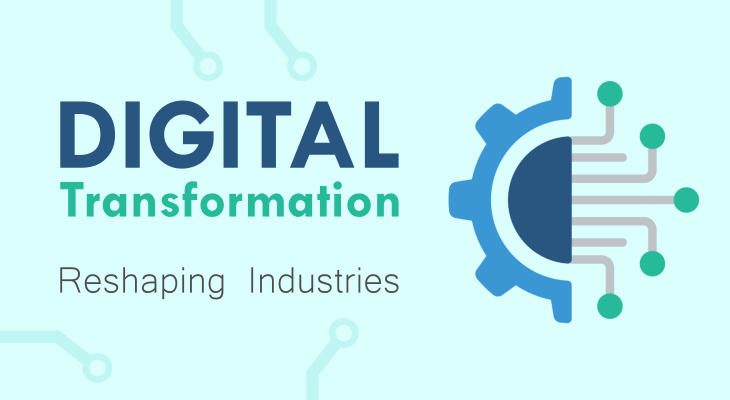How Digital Transformation is Reshaping Industries
Digital transformation is a profound and ongoing shift in the way businesses operate, driven by the adoption of digital technologies. This transformation is not just about digitizing existing processes but fundamentally changing how businesses create value, interact with customers, and compete in the market. At its core, digital transformation involves leveraging technologies such as cloud computing, artificial intelligence, big data, and the Internet of Things to drive efficiency, innovation, and growth. The impact of digital transformation is being felt across various industries, reshaping their landscapes and creating new opportunities and challenges.
One of the most significant impacts of digital transformation is on customer experience. Companies are increasingly using digital technologies to understand their customers better and deliver personalized experiences. By analyzing data from multiple sources, businesses can gain insights into customer preferences, behaviors, and needs, enabling them to tailor their products and services accordingly. For example, in the retail industry, companies are using AI-powered recommendation engines to provide personalized product suggestions, enhancing customer satisfaction and driving sales. Additionally, digital channels such as mobile apps, social media, and chatbots are enabling businesses to engage with their customers in real-time, providing instant support and building stronger relationships.
Digital transformation is also driving operational efficiency and agility. By automating repetitive tasks and streamlining processes, businesses can reduce costs, improve productivity, and respond more quickly to market changes. In the manufacturing sector, for instance, the adoption of Industry 4.0 technologies such as IoT and robotics is revolutionizing production processes. Connected devices and sensors provide real-time data on equipment performance, enabling predictive maintenance and reducing downtime. Robotics and automation are also enhancing precision and speed, leading to higher quality products and increased output. These advancements are not only improving operational efficiency but also enabling manufacturers to meet the growing demand for customized products.
The financial services industry is another sector undergoing significant transformation. Digital technologies are enabling banks and financial institutions to offer more convenient and secure services to their customers. Mobile banking apps, online payment systems, and digital wallets are making financial transactions faster and more accessible. Blockchain technology is also being explored for its potential to enhance security and transparency in financial transactions. By creating immutable and decentralized records, blockchain can reduce fraud and streamline processes such as cross-border payments and trade finance. Moreover, the use of AI in financial services is enabling more accurate risk assessment, fraud detection, and personalized financial advice, enhancing both operational efficiency and customer satisfaction.
In the healthcare sector, digital transformation is improving patient care and operational efficiency. Electronic health records (EHRs) are enabling healthcare providers to access and share patient information more easily, improving coordination and reducing errors. Telemedicine is expanding access to healthcare services, allowing patients to consult with doctors remotely and receive care from the comfort of their homes. AI and machine learning are also being used to analyze medical data, enabling early diagnosis and personalized treatment plans. For instance, AI algorithms can analyze medical images to detect diseases such as cancer at an early stage, improving patient outcomes. Additionally, wearable devices and remote monitoring tools are enabling continuous tracking of patients’ health, allowing for timely interventions and better management of chronic conditions.
The education sector is also being transformed by digital technologies. E-learning platforms and digital classrooms are making education more accessible and flexible. Students can now access a wealth of educational resources online, participate in virtual classrooms, and collaborate with peers from around the world. AI-powered tutoring systems are providing personalized learning experiences, helping students learn at their own pace and improving learning outcomes. Digital technologies are also enabling more efficient administration and management of educational institutions, from enrollment and attendance tracking to grading and communication. These advancements are not only enhancing the learning experience but also making education more inclusive and equitable.
The transportation and logistics industry is benefiting from digital transformation through improved efficiency and customer experience. IoT and GPS technologies are enabling real-time tracking of vehicles and shipments, providing greater visibility and control over the supply chain. AI and machine learning are being used to optimize routes, reduce fuel consumption, and improve delivery times. For example, logistics companies are using AI algorithms to analyze traffic patterns and predict delays, allowing them to adjust routes and schedules accordingly. Digital platforms are also enabling more efficient management of transportation networks, from ride-sharing and fleet management to warehousing and inventory control. These advancements are reducing costs, improving service quality, and enhancing the overall efficiency of the transportation and logistics industry.
In the energy sector, digital transformation is driving innovation and sustainability. Smart grids and IoT-enabled devices are providing real-time data on energy consumption, enabling more efficient management of energy resources. AI and machine learning are being used to optimize energy production and distribution, reducing waste and improving reliability. For instance, AI algorithms can predict energy demand and adjust production levels accordingly, minimizing the use of non-renewable energy sources and reducing emissions. Digital technologies are also enabling the integration of renewable energy sources into the grid, supporting the transition to a more sustainable energy system. Moreover, digital platforms are empowering consumers to monitor and manage their energy usage, promoting energy conservation and reducing costs.
The real estate industry is also experiencing a transformation driven by digital technologies. Virtual reality (VR) and augmented reality (AR) are enabling immersive property tours, allowing potential buyers to explore properties remotely. Digital platforms are streamlining property management and transactions, from listing and marketing to contract signing and payments. AI and big data are being used to analyze market trends, predict property values, and provide personalized recommendations to buyers and sellers. These advancements are enhancing the efficiency and transparency of the real estate market, making it easier for consumers to find, buy, and manage properties.
Digital transformation is reshaping industries in profound ways, driving innovation, efficiency, and growth. By leveraging digital technologies, businesses can enhance customer experience, improve operational efficiency, and create new opportunities for growth. However, the journey of digital transformation is not without challenges. Businesses must navigate issues such as data security, privacy, and the digital skills gap. Successful digital transformation requires a strategic approach, strong leadership, and a culture of innovation and agility. As industries continue to evolve in the digital age, those that embrace digital transformation and adapt to the changing landscape will be well-positioned to thrive and succeed.

